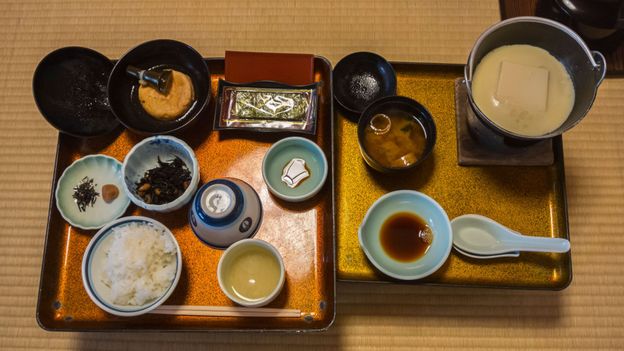Believed to align the mind, body and soul
 Edged in vibrant pink, a shadow-thin slice of radish sits atop a soft square of sesame tofu.
Edged in vibrant pink, a shadow-thin slice of radish sits atop a soft square of sesame tofu.
Beside it, a pot of udon simmers gently while a nearby basket holds a nest of crisp
tempura – forming just three of the dozen dishes set before me. We are seated in a quiet
tatami room at Ekoin, one of more than 100 temples that form the ancient complex of
Koya in rural Wakayama prefecture. Perched on the mountainside, the town is the centre
of Shingon Buddhism, and our meal is known as shōjin ryōri, a spiritual cuisine perfected
by monks over centuries.
Known for its moss-covered cemeteries and forested pilgrimage routes, Koya is home to
a long tradition of worship. The town’s many temple lodgings, known as shukubo,
offer visitors the chance to experience the ways of Buddhism, from meditation to
calligraphy – but few know that the humble temple meals are also an opportunity for
spiritual exploration.
Often called “devotion cuisine”, shōjin ryōri was developed by monks, but has recently
found its way from temple restaurants to Tokyo’s Michelin-star tables. Both minimal and
plentiful, it is often associated with austerity; however, dedicated chefs profess a myriad
of visual, technical and seasonal combinations are possible.
Arriving in Japan with Buddhism in the 6th Century, shōjin cuisine was traditionally
a simple affair, preserved by hard-working priests and monks, explains Shiten, Ekoin’s
resident priest. It was the teachings of 13th-Century writer and Soto Zen school founder,
Dogen, however, that pioneered the spiritual focus of the art. Dogen believed that,
similar to the practice of flower arranging or tea ceremony, shōjin ryōri had the power
to align mind, body and soul.
Follow the situation here. : ทางเข้า slotxo
|
|